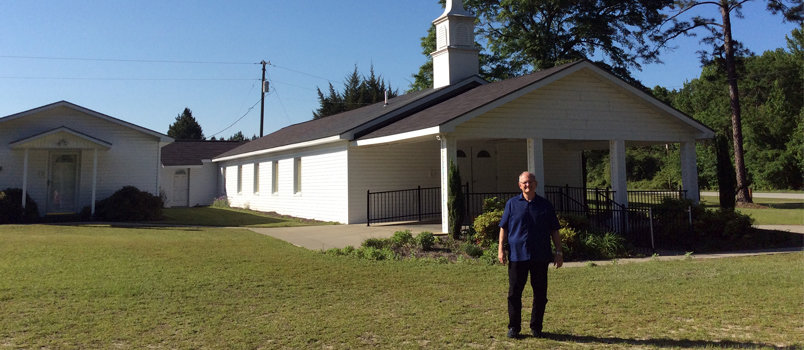 Robby Smith stands in front of Mt. Shady Baptist Church, one of the many bivocational congregations in Daniell Baptist Association.
Robby Smith stands in front of Mt. Shady Baptist Church, one of the many bivocational congregations in Daniell Baptist Association.The need for bivocational pastors has never been starker for Robby Smith, director for Daniell Baptist Association.
"We have 51 churches, 41 of them being part-time," he said, noting another church had recently moved its pastor to bivocational status after years of declining finances. "Most of our churches are declining numerically, and the ones plateaued are struggling financially. Members are getting older and with lower incomes it's tough to find pastors – especially younger ones – to stay here."
Attracting a bivocational pastor is a little easier should you be located in a resort setting or college town. Daniell Association has Brewton-Parker College, but otherwise inhabits its own section of Georgia's coastal plain among Montgomery, Treutlen, Wheeler, and Toombs counties as well as a section of Emanuel County.
Montgomery County, where the association's office is located, has less than 9,000 residents on 245 square miles, 53% of it farmland. Making enough enough to support a family means you’re a pretty good farmer or have a government job, said Smith, who's been in the area for eight years.
"We've probably got the highest number of bivocational pastors in the state, along with our neighboring associations," he stated.
Getting ministers for churches is the goal, he repeats, but it's equally important for them to be trained in the role of a pastor and sound in their theology. Different options are being trotted out, including on-the-go alternatives such as learning through podcasts.
"We have to work with these guys and their [time/financial] restraints," he said. "They can't afford $7,000 a year to earn a degree through Liberty."
Online courses in Christian Studies are available through Shorter University and Truett-McConnell College. “We’ve been meeting with Brewton-Parker,” Smith added, “to see if we could partner in getting potential pastors, but I don’t see those positions returning to full-time. [To fill them] we need men to get a heart for God and their community.”
The logistics of making time for wife and kids plus ministry while getting a degree can be daunting.
“It’s difficult for guys to attend class in addition to tending to family and work responsibilities, and I don’t see people moving from outside our area to become pastors,” Smith said. “The best option is raising up those here who will serve these churches.”